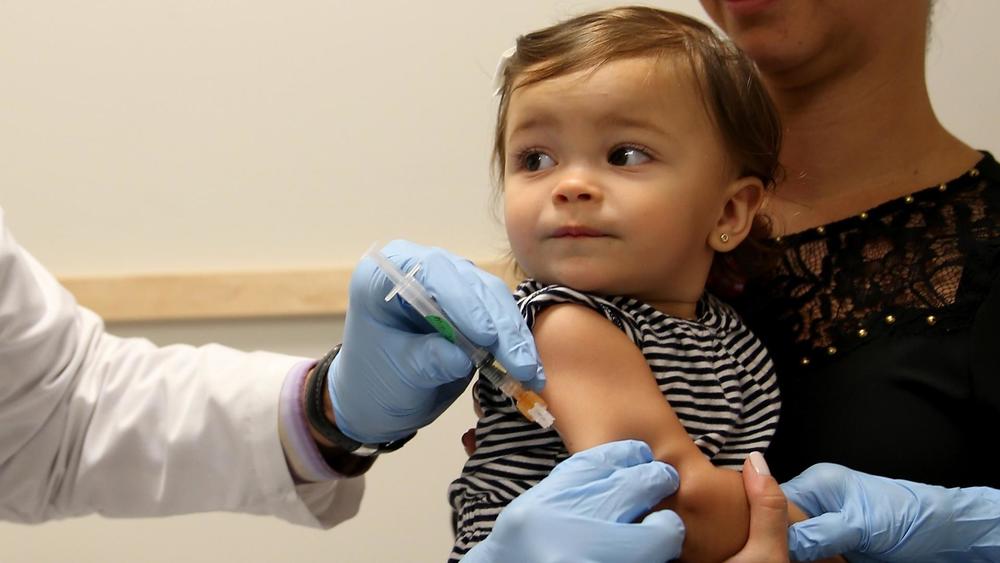
Section Branding
Header Content
Georgia’s first reported case of measles since 2020 spurs public health concern of spread
Primary Content

The Georgia Department of Public Health has confirmed a case of measles in metro Atlanta, the first since 2020.
“DPH is working to identify anyone who may have had contact with the individual while they were infectious,” the department said in a statement. “Measles is very contagious and spreads through the air when an infected person coughs or sneezes. Measles virus can stay in the air or on surfaces for up to two hours after an infected person has left the room.”
Symptoms of measles usually appear one to two weeks after exposure and can include high fever, cough, runny nose and watery eyes followed by a rash of tiny red spots. In some cases, patients can develop potentially fatal complications including pneumonia and swelling of the brain.
If you have symptoms of measles, call your doctor, clinic or hospital and tell them about it before going in, the DPH says.
Young children, pregnant women and older adults are at the greatest risk, but most Americans do not need to worry about catching it. Measles is preventable with two doses of a vaccine called MMR (measles, mumps and rubella), which doctors recommend for all babies as part of their routine health care.
“One case is one too many and runs the risk of spreading to other unvaccinated children and children who are unprotected, including those who are immunocompromised,” said Dr. Harry Heiman, a public health professor at Georgia State University.
The Atlanta-based Centers for Disease Control and Prevention recommends children get their first dose of MMR vaccine between 12 and 15 months and their second dose between 4 and 6 years old. More than 95% of the people who receive a single dose of MMR will develop immunity to all three viruses. A second dose boosts immunity, typically enhancing protection to 98%, DPH says.
The first measles vaccine was licensed in 1963, and the vaccine offered today has been in use since 1968, according to the CDC.
The vaccines were so successful that measles was declared eliminated in the United States in 2000 — to doctors, elimination means there was no continuous spread within the country for one year; completely reducing a disease to zero worldwide is called eradication.
Measles is still considered eliminated in the U.S., though cases still arise when people travel to and from other countries where the virus is endemic. The current metro Atlanta patient was exposed to measles while traveling abroad, according to Georgia DPH.
Last year, the CDC reported 48 measles cases nationwide, down from 121 in 2022, but five years ago, an outbreak infected more than 1,200 people, for a time threatening the disease’s elimination status in the U.S. The vast majority of those cases were in close-knit communities among people who were not vaccinated.
A CDC report found that nationwide, the number of new kindergarten students with an exemption for any vaccine rose .4% to 3%, the highest exemption rate ever reported. Nonmedical exemptions make up more than 90% of the total and account for approximately 100% of the growth in the exemption rate.
Georgia’s kindergarten exemption rate fell by .9% from the previous school year, but at 3.8%, it is still higher than the national average.
“The more critical number is the percentage who are vaccinated and, therefore, protected,” Heiman said. “For Georgia, during the 2022-2023 school year, this number was 88%. Unfortunately, that means there are many students who are unprotected and at-risk for contracting measles. I would hope that this case serves as a wake-up call for schools, health care providers and our public health agencies to focus additional resources to ensuring that systems are in place to make sure that all Georgia’s children are up to date on these critical vaccines.”
A World Health Organization and CDC report found measles on the rise worldwide, with cases in 2022 increasing 18% to 9 million and deaths up 43% to 136,000, mostly among children.
Part of the increase may be a lingering effect of the COVID-19 pandemic, WHO officials say, as millions of children worldwide skipped doses of routine vaccinations because of pandemic restrictions and lockdowns and never got them. As of November, researchers estimate that 22 million kids missed their first dose and 11 million missed their second.
“Measles cases anywhere pose a risk to all countries and communities where people are under-vaccinated,” said John Vertefeuille, director of CDC’s Global Immunization Division in a statement. “Urgent, targeted efforts are critical to prevent measles disease and deaths.”
This story comes to GPB through a reporting partnership with Georgia Recorder.

